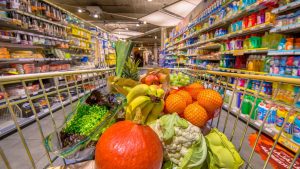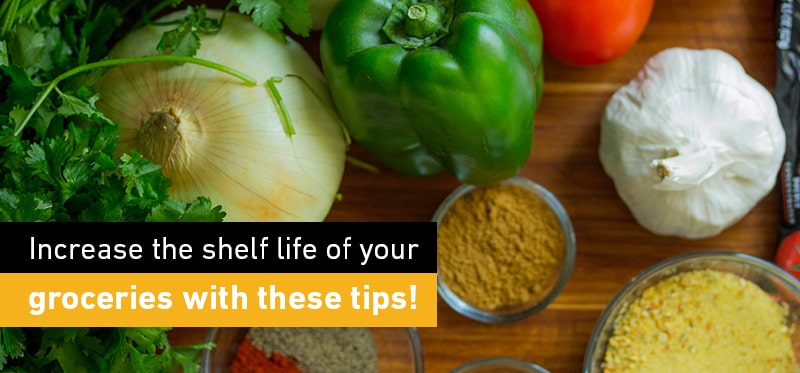This article will take <1 minute to read.

Buying groceries in large quantities is always cheaper. The supermarkets make sure of that with all their offers and discounts. And yes, I understand that resisting the lures of discounts is not an easy task. But with large quantities of groceries, comes a great responsibility to store groceries in such a way that they last longer.
Keeping track of all our groceries seems to be an additional burden when you are busy. In this process, a lot of our groceries either get spoilt or lose their freshness. This leads to a lot of wastage. 40% of the food we buy can get wasted due to improper storage. Every item seems to have a different shelf life and if you are a beginner in the kitchen it might seem overwhelming to remember them all.

Here are some easy tips on how to store groceries to increase their shelf life:
- Rice: Rice should be stored in an airtight stainless steel container with neem leaves. This prevents worms from infesting the rice. Make sure that the leaves are completely dry. You could also add bay leaves.
- Lemons: Coat the lemons with any kind of oil coconut/ vegetable oil, store them in airtight containers and keep them in the refrigerator.
- Tomatoes: It’s better to buy small quantities of fresh tomatoes and store them in the fridge. After some time they lose their best qualities and their taste changes. Ripe tomatoes make other vegetables ripe faster and spoil. Therefore store them separately.
- Eggs: Keep eggs in a carton and store them in the back of the fridge on the upper shelves. This will prevent them from getting exposed to change in temperatures when you open the fridge. The constant change in temperature can make them spoil faster.
- Apples: Apples shouldn’t be refrigerated. You can store them in a box filled with onion skins. The onion skin will absorb the moisture and keep them fresh.
- Paneer: Place paneer in slightly salted water and store it in the refrigerator. Change the water every day, the paneer will stay fresh for a longer time.
- Onions and garlic: Onion and garlic prefer warm temperatures. They also don’t last fresh in too much sunlight. So store them in a dark place or inside a bag. Do not keep them in the fridge.
- Idli/dosa batter: To store idli/dosa batter and prevent it from getting sour, add the batter in a container and then cover it with a banana leaf on the top.
- Greens: Store greens in airtight containers or steel containers. Add paper towels over and below the greens. This way the paper towel will soak any excess moisture and the greens will last for more than a week.
- Milk, yogurt and cheese: Milk and yogurt should be stored on the middle shelves and not on the fridge doors. Cheese should be wrapped in a plastic film or foil to prevent the growth of mold and to prevent the cheese from drying out.
- Meat: It’s better to buy meat on the day you are cooking it. If not, make sure to keep them in the freezer at very low temperatures.
- Dal/lentils: To increase the shelf life, dry the lentils under the sun. Make sure that the container you store dal in is dry. Add asafoetida in the middle of the container. This will keep insects and bugs away from infesting the dal.
- Pappad: Use an airtight container or steel containers to store papads. Add 2-3 pieces of asafoetida/hing and a few red chilli. You can also sprinkle some red chilli powder. This will prevent ants from infesting the papads.
- Honey: Honey should be stored in a glass, ceramic, or metal container. It’s ideal to keep it in a dark and dry place. If it is exposed to sunlight, it will lose its antibacterial properties.
- Watermelon and melons: Fruits like watermelon and regular melon should be stored at room temperature. If they are kept in the fridge, they lose their antioxidants.
Make sure to use these simple measures to store your groceries so that the next time your dish is a disaster, you don’t have the ingredients to blame. And if you still think that managing your groceries is a hassle or you don’t have time to cook, order your food from Masala Box. Masala Box delivers delicious home-cooked meals by our home chefs. It’s a healthy, easy, and reliable alternative to cooking.
